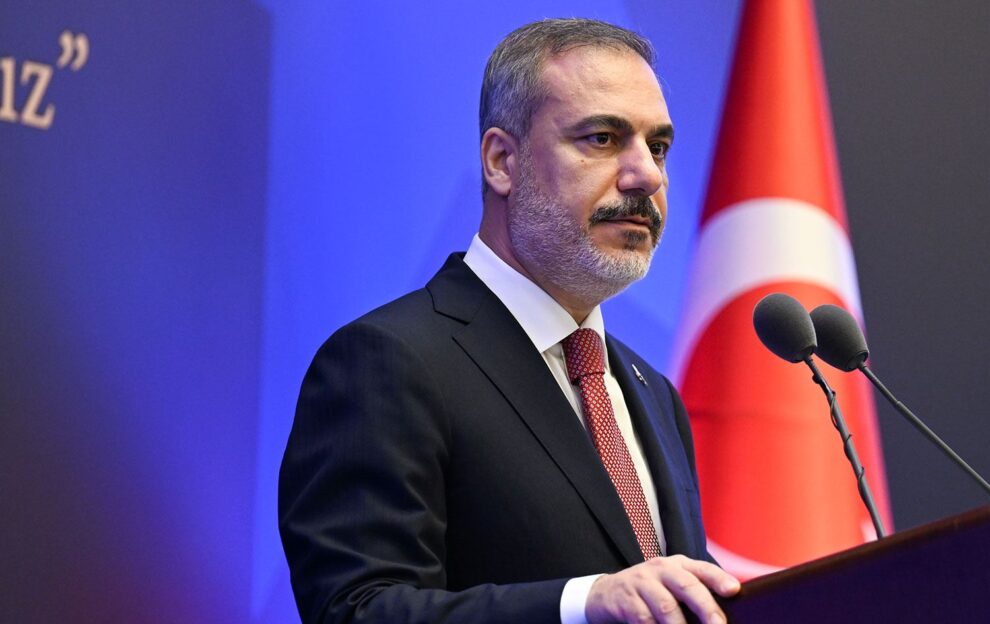When Turkish Foreign Minister Hakan Fidan, side by side with his Greek counterpart, announced on Tuesday that Turkey had entered a new and positive era with Greece, there was disbelief among many in Athens.
“Already?” George, a retired ship captain in his 60s, snorted. “I don’t remember how many times we heard the same things.”
Being neighbours and historic nemeses for the past century, Turkey and Greece have had occasional shouting matches, near-conflict incidents, and times of cooperation over the decades.
Yet relations between the countries came very close to a possible hot war in 2020, when Turkish and Greek warships collided over an energy drilling disagreement stemming from exclusive economic zones.
The relationship further eroded after Turkish President Recep Tayyip Erdogan met Greek Prime Minister Kyriakos Mitsotakis in March 2022 in Istanbul, where both sides decided to calm the waters before national elections in both countries, promising not to use each other during the campaign to collect votes.
Erdogan later felt betrayed by Mitsotakis in May last year, when he joined a campaign to deny US military jets to Turkey during an address to the US Congress.
‘This is more about normalising the relationship before we could talk about the decades old disputes’
– Turkish source
“We will come overnight,” Erdogan began to repeat on every occasion with Greece afterwards, threatening his neighbour with invasion, though no one believed him at home.
But now both Turkish and Greek sources familiar with the relationship tell Middle East Eye that they expect genuine progress in repairing it.
“When we say progress, people think we will resolve everything overnight,” a Turkish source told MEE, speaking anonymously because he wasn’t authorised to talk to the media.
“But this is more about normalising the relationship before we can talk about the decades-old disputes.”
‘We are hopeful’
Turkey and Greece have a set of issues, from the size of territorial waters, to airspace and exclusive economic zones, to minorities.
“We have to cool off and then we will see, we are hopeful,” a Greek source said. “We can find many areas of cooperation, we don’t need to talk about the outstanding disagreements.”
Another Greek source joked that regular engagements could be a huge update, since every Greek military officer wakes up in the morning with the idea that Turkey could invade any minute for the past three decades.
“We are a small country, Turkey is a big country with a lot of means,” the source explained. “We give too much meaning even to the slightest things in Turkey, which usually don’t mean anything.”
Both sides have more incentive to repair this broken relationship after this year’s elections, in which both nations re-elected their right-wing nationalist leaders.
Many in Athens see Fidan, the former Turkish intelligence chief, as good news for Turkish-Greek relations. Fidan is known for his acumen, and his long-term overview of issues.
“He is a problem-solver, not a creator,” says another Turkish source. “He can play hardball if it is needed, but he doesn’t prefer that.”
But the main motivation for both sides is the changing regional dynamics.
Two years ago, Ankara was feeling encircled by an emerging Greek, Cypriot, Israeli and Egyptian alliance in the Eastern Mediterranean, backed by Washington.
“This was Ankara’s own creation, nothing to do with us,” the second Greek source joked. “They started to fight with everyone.”
Agree to disagree
Now Ankara stands in a better position against Athens. It has repaired its ties with Israel and Egypt, and the relations with Washington appear on track with the deal cut on Sweden’s accession to Nato.
As part of the deal, Turkey is poised to get dozens of F-16s through the US Congress, with Athens also getting fifth-generation F-35 fighter jets in the same package.
Turkey has other incentives too. Erdogan wants to revive Turkey’s EU accession track to lure western investors back. And a better relationship with Greece could just help that.
‘Deep down, Turks and Greeks love each other, because we are similar peoples who have lived together for centuries’
– Greek source
“We are aware that resolving outstanding bilateral issues such as airspace or exclusive economic zones would take a very long time, and we are not clear if we can ever do that,” the first Turkish source said.
“What we can do is agree to disagree on those issues, and freeze them. And stop the escalation.”
The Greek sources agree with that assessment.
“Then we may talk about these issues in the future, after building confidence,” the source said.
That’s why Greek Foreign Minister Giorgos Gerapetritis this week announced that a high-level cooperation council between the countries will take place before the end of 2023, the first such meeting in seven years.
Erdogan and Mitsotakis are also expected to meet on the sidelines of UN General Assembly meetings later this month in New York.
“Deep down, Turks and Greeks love each other, because we are similar peoples who have lived together for centuries, share the same food and culture,” the second Greek source said.
George, the retired captain who is a Mitsotakis voter, concurs with that assessment, underlining how both people have similar nationalist traits.
“I like Erdogan,” he said. “He is a strong leader who transformed Turkey into a regional power with a strong defence industry and commercial infrastructure.”
Source : Middle East Eye















